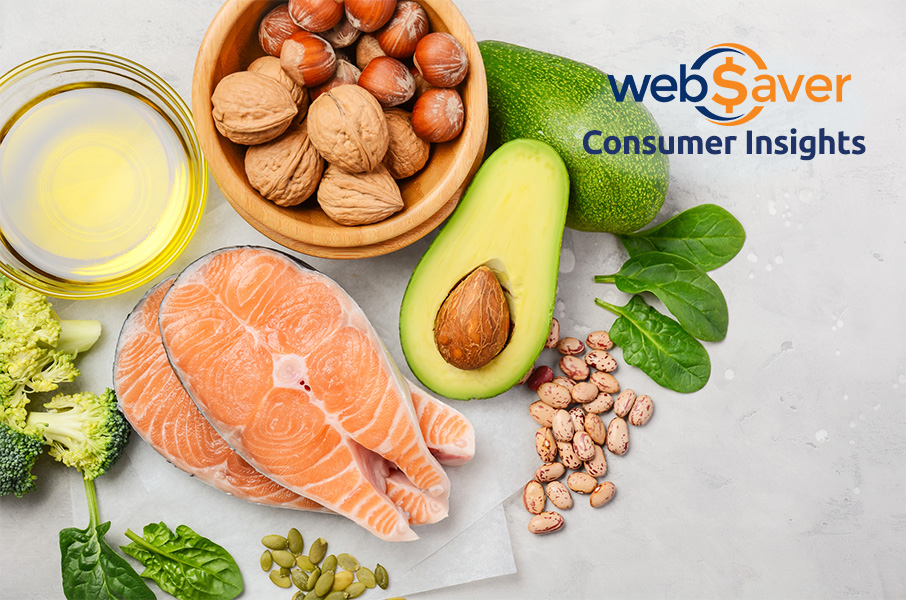by webSaver
October 9, 2023
Share

For well over a year Canadian grocery prices have been increasing rapidly and unfortunately they still show few signs of slowing down. While these increases were being initially attributed to the historical jump in the overall inflation rate that has taken place in the aftermath of the COVID pandemic resulting from massive monetary stimulus and supply disruptions, it seems clear that the inflation increases in Canadian grocery food prices have been significantly more sticky.
This is a story that we have been covering in depth throughout the year because it affects so many of our webSaver members and CPG Brand partners. We saw for example that in late June 2023 when the overall inflation rate had already decreased to 3.4%, the inflation rate for groceries remained well over 9%, almost triple. Canadian consumers are under duress since this jump in inflation is coming at the same time as some of the fastest increases in interest rates in our history. These factors combined are forcing Canadian households to make very difficult choices with regards to their spending on groceries and nutrition.
The situation has gotten so difficult for many Canadians that it has forced the government to intervene to try to ‘stabilize grocery prices’ and they met with the heads of Canada’s five largest grocery chains to seek to find ways to do so. The discussions were held under the threat of windfall taxes being levied on the grocery chains in this highly concentrated market. More recently these Big Five grocery chains have delivered plans to stabilize food prices to the federal government.
In this context the Agri-Food Analytics Lab at Dalhousie University, led by Sylvain Charlebois, conducted a comprehensive study in September 2023 to gain deeper insights into how Canadians are navigating the intricacies of higher food prices. Some of the findings are impactful, even eye opening regarding how difficult a situation some of our fellow Canadians are enduring due to high food prices as well as the compromises they are having to make. Basically rising food prices are placing Canadians in the tough position of having to choose between the nutritional quality of their meals and what fits within their budgets.
The study, encompassing the perspectives of over 5,000 Canadians, uncovered that nearly 50% are now prioritizing the cost of food over its nutritional content when making their grocery selections. Additionally, a notable 63% express concerns that compromising on nutrition due to high food prices could result in long-term adverse health effects.
Findings from the survey reveal a significant shift in the shopping behaviors of 64.1% of Canadians, demonstrating substantial alterations in their grocery routines. Remarkably, 86.4% of Canadians now identify themselves as more price-conscious when compared to their mindset a year ago. In response to the increasing costs, 55.1% have adopted various cost-saving strategies over the past year, including the use of coupons, apps, loyalty programs, and price comparison in flyers.
Noteworthy participation is seen in loyalty programs at 79.2%, closely followed by coupon usage at 74.8%. It is important to note that at such a high rate of consumer adoption it is incumbent on Brands that want to keep their best customers, or generate trial purchases from new customers, to undertake online coupons and cashback offers initiatives to capitalize on this historic opportunity. Consumers have never been so eager to utilize coupons for their grocery purchases, let it be your coupons and not your competitors.
Additionally, 52.8% have explored apps designed for food rescue, and 41.4% actively seek out “enjoy tonight” deals, showcasing a proclivity towards more immediate consumption. Moreover, 49.7% of Canadians are even contemplating the idea of cultivating their own food as a countermeasure to mitigate the financial impacts of food price inflation.
More than 49% of surveyed Canadians have opted to reduce their purchases of meat and protein sources due to the escalating costs of food. Similarly, 46% have scaled back their consumption of fruits and vegetables as a response to food inflation.
Significantly, 59.3% of Canadians are displaying an increased inclination to shop at discount stores, a large increase from the preceding 12 months. In a similar vein, 47.0% have augmented their visits to dollar stores compared to a year ago, underscoring their deliberate pursuit of cost savings in their grocery spending. Moreover, 18.5% of Canadians are now making more frequent visits to farmers’ markets.
The findings are prompting reflection, with the researchers noting astonishment at the significant number of people focusing on price rather than nutritional value. It’s a noteworthy concern as escalating food prices may lead consumers to shy away from the healthier options found on the periphery of grocery stores.
In these challenging economic times an effective online grocery coupons and cashback offers strategy is a great way to attract, engage and retain your best customers and build loyalty. As stated in the article Canadian consumers are actively seeking ways to save money with coupons. Keep your customers for the long term and put the power of coupons to work for your Brand with help from the coupon experts at webSaver.
With over 10 years leading the Canadian online coupons marketplace and 150 Million coupon issued we know coupons. We’ve worked with 90% of Canada’s leading consumer packaged goods brands providing them with the online coupons and cashback offer solutions that generate real value for their business. Whether your strategic objective is customer acquisition, customer lift (Increased transaction size and frequency) or customer retention webSaver can help.




